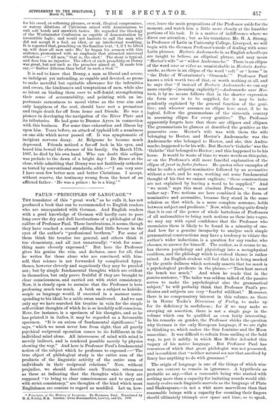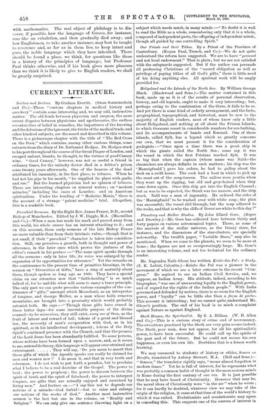PAUL'S "PRINCIPLES OF LANGUAGE."* THE translator of this " great
work," as he calls it, has not produced a book that can be recommended to English readers who are unacquainted with German. And English readers with a good knowledge of German will hardly care to pore long over the dry and dull lucubrations of a philologist of the calibre of Professor Paul. These lucubrations, it seems, though they have reached a second edition, find little favour in the eyes of the author's " professional brethren." For some of them think his treatise too general, and others think it too elementary, and all (not unnaturally) " wish for some- thing more cleverly expressed." But here the Professor gives his genius the rein, and declares, once for all, that he writes for those alone who are convinced, with him- self, that science is not forwarded by complicated hypo- theses, however cleverly and sagaciously they may be puzzled out; but by simple fundamental thoughts which are evident in themselves, but only prove fruitful if they are brought to clear consciousness, and carried out with strict consistency. Now, it is clearly open to surmise that the Professor is here professing much too much. A book on a subject so kaleido- scopic as language would, if executed in a manner corre- sponding to his ideal, be a sable swan unsilvered. And we can only say we hate searched his treatise in vain for the simple self-evident thoughts of which he is so laudably self-conscious. Here, for instance, is a specimen of his thoughts, and as he has printed it in italics, it may be regarded as a favourable specimen. "It is an axiom of fundamental significance," he says, " which we must never lose from sight, that all purely psychical reciprocal operation comes to its fulfilment in the individual mind alone. All intercourse of mind with mind is merely indirect, and is rendered possible merely by physics showing the way." And here is Professor Paul's fundamental notion of the subject which he professes to expound :—" The true object of philological study is the entire sum of the products of the linguistic activity of the entire sum of individuals in their reciprocal relations." Now, without prejudice, we should describe such Teutonic utterances as these as indicating that the thoughts which they are supposed " to bring to clear consciousness and to carry out with strict consistency," are thoughts of the kind which most Englishmen are content to regard as muddled. Let us, how.
• Principles of the History of Language. By Hermann Pant. Translated by H. A. Strong, M.A. London: bwan Sonnenachein, Lowrey, and Co. 1898.
ever, leave the main propositions of the Professor aside for the moment, and watch him a little more closely at the humbler portions of his task. It is a matter of indifference where we direct our attention ; but as his translator, Mr. H. A. Strong, is Professor of Latin in University College, Liverpool, we will begin with the German Professor's mode of dealing with some Latin phrases. Hectoris Andromache is, as English schoolboys are taught to believe, an elliptical phrase, and may mean " Hector's wife " or " widow Andromache." There is an ellipse of the word =or or vidua as unmistakable in Hectoris Andro- mache, as there is an ellipse of the word " colt " or " horse " in " the Duke of Westminster's Or monde.' " Professor Paul knows a trick worth two of that, or worth nothing at all, and he says that "if instead of Hectoris Andromache we can say more exactly—[meaning explicitly P]—Andromache =or Hec- toris, it by no means follows that in the shorter expression the form uxor is to be supplied, for• it may be inde- pendently explained by the general function of the geni- tive; and whoever assumes an ellipse here must, if he be logical, follow the grammarians of the sixteenth century in assuming ellipse for every genitive." The Professor apparently forgets here that there are ellipses and ellipses. The grammarians he glances at described the genitive as the possessive case. Hector's wife was with them the wife belonging to Hector, and Hector's Andromache was the Andromache who belonged to Hector, and she, this Andro- mache, happened to be his wife. But Hector's' 0-alathe' was the Galathe ' that belonged to Hector ; and this happened to be his horse. It would be waste of time to waste words on this point, or on the Professor's still more fanciful explanation of the ellipse of juvat in fortes fortuna. He quotes other examples of what he calls a subject-nominative followed by an accusative without a verb, and he says, working out some fundamental thought of his that we cannot explicate, " these constructions are not explained by leaving a word to be supplied." And " we must," says this most absolute Professor, " we must rather say : Two notions are here combined in the form of nominative and accusative, because they stand in the same relation as that which, in a more complete sentence, holds between subject and predicate." Now, while saying quite firmly that it is out of the power of whole battalions of Professors of all nationalities to bring such notions as these into vogue, we may say with equal confidence that the Professor who enunciates them is likely to be found in a minority of one. And bow far a genuine incapacity to analyse such simple grammatical constructions may have a tendency to vitiate the author's wider inductions, is a question for any reader, who chooses, to answer for himself. The author•, as it seems to us, has thrown psychology and physiology into a metaphysical cauldron, and the philology which is evolved thence is rather mixed. An English student will feel that he is being mocked by the gentle dullness which seriously asserts that too much is a psychological predicate in the phrase,—" Thou hast moved the bench too much." And when he reads that in the passive sentence, " The tailor was seldom talked of, the passive serves to make the psychological also the grammatical subject," he will probably think that Professor Paul's pre- dicates and subjects are very " fearful wildfowl." Moreover, there is no compensatory interest in this volume, as there is in Horne Tooke's Diversions of Purley, to make up for its deficiency in usefulness ; for if we may make so sweeping an assertion, there is not a single page in the volume which can be qualified as even fairly interesting. In his remarks on gender, the Professor shirks the question why German is the only European language, if we are right in thinking so, which makes the Sun feminine and the Moon masculine. It was difficult to refrain from smiling at the bold way, to put it mildly, in which Max Mailer defended this vagary of his native language. But Professor Paul has resources of which that great philologist was not possessed, and is confident that " neither natural sex nor that ascribed by fancy has anything to do with grammar."
The origin of language is one of the things of which wise men are content to remain in ignorance. A hypothesis as probable as any,—that a reasonable being who started with nothing more than a capacity for imitating sounds would ulti- mately evolve such linguistic marvels as the language of Plato and Shakespeare, is not a whit more marvellous than that reasonable beings with a capacity for counting their fingers should ultimately triumph over space and time, so to speak,
with mathematics. The real object of philology is to dis- cover, if possible, how the language of Greece, for instance, rose like an exhalation, and then gradually died away; and how Englishmen, to take another instance, may best be taught to reverence and, as far as in them lies, to keep intact and pure, the noble language which they have inherited. There should be found a place, we think, for questions like these in a history of the principles of language ; but Professor Paul thinks otherwise, and if his book gives more pleasure than we think it is likely to give to English readers, we shall be greatly surprised.



















































 Previous page
Previous page